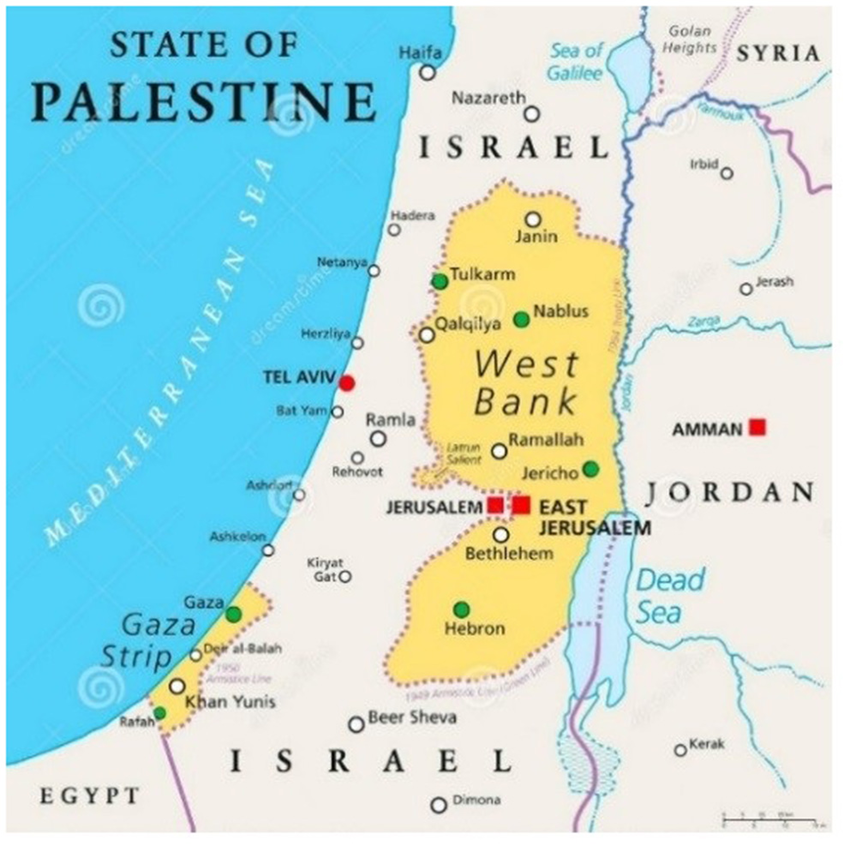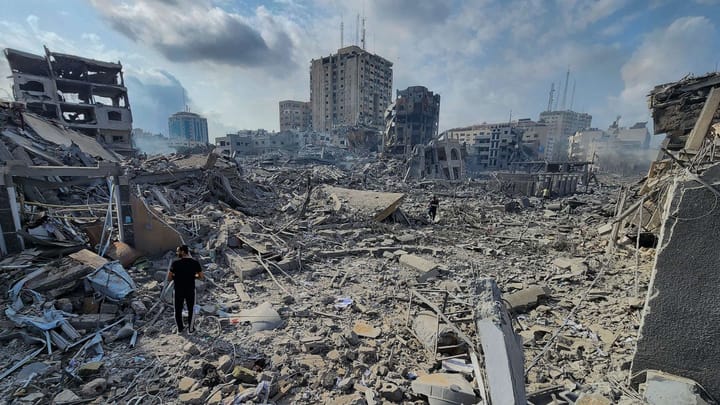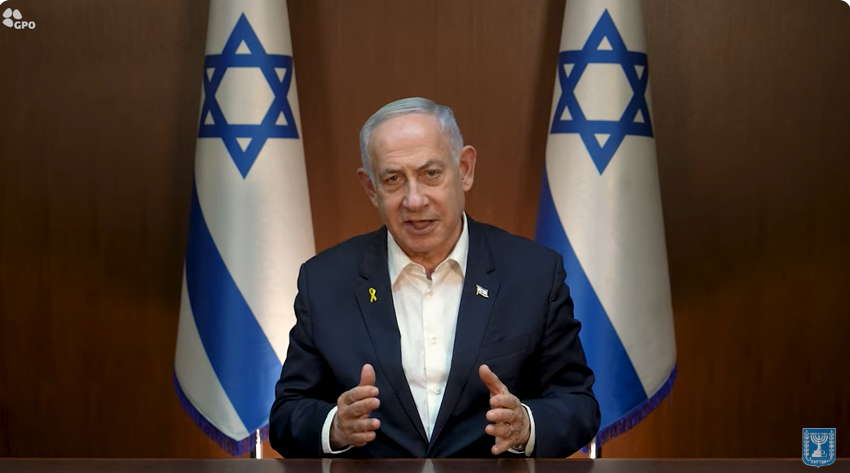A Second Look at the United Palestinian Emirates Proposal

It sounds blasphemous when one hears Mordechai Kedar’s “Palestinian Emirate” proposal. What? Should Palestinians retreat into small city-states in the West Bank and Gaza? While Israel takes all the land? That is insane!
True, the immediate outrage is natural. However, when one thinks critically about the United Palestinian Emirate proposal, it can be an excellent preparation for incubating and creating a functional and lasting Palestinian state. Each emirate will function fairly independently, and their leaders will be part of a broader federal Palestinian authority that will decide and steer affairs credibly. This article examines five cogent pointers that could justify the commencement of a path toward statehood through the emirate model.
Statecraft – The Majlis System
For 76 years, many political experiments have been tried to establish a Palestinian state. The Palestinian people were incorporated into the Jordanian and Egyptian states. It failed. Yassir Arafat used all means – militarily and diplomatically, so a Palestinian state could not be established. After the passing of Arafat in 2004, there have been a lot of attempts to regularize and maintain a Palestinian Authority. That has also not worked. Hamas in the Gaza Strip used guerilla fighting tactics, but it has not worked.
However, states like the United Arab Emirates and Qatar gained independence in 1971, and since then, they have grown into prosperous and successful states. That means that the Palestinian people expended their energies on pathways that failed while their Gulf neighbors managed to build viable states in relative peace and prosperity.
Yes, the Emiratis and Qataris did not have to go up against a sovereign state. They had to contend with as the Palestinians have done with the Israelis. However, there are apparent internal issues that have stood in the way of Palestinian statehood.
The Majlis model, which allowed successful Islamic countries to build strong cohesion and better governance systems, has been lacking from the Palestinian state development system.
What if the Palestinians can gain longer-term statecraft through the Emirate model. This would lead to the creation of several Majlis that would bring together families and clans in various Palestinian cities. This could lead to seven to ten Palestinian city states that can build understanding and cooperation from the grassroot.
Through these grassroot Majlis, bigger cooperations could occur among Palestinian city states, and the society can grow and develop.

The top-down approach used by the international community to create a Palestinian state has failed. That is because it excludes the locals and places emphasis on a few internationally recognized leaders who develop a network of cronies. Ultimately, they become authoritarian and whatever state they build, fails. The Majlis system almost always precedes the successful statehood of every Islamic nation in history. The Palestinians have a unique chance to develop statehood through this bottom up model and it will be a departure from the top-down experiments which have failed to this point.
Human Dignity, Prosperity and Peace
It is becoming common in the media to see innocent Gazans screaming just to return home. Prices of goods and services in Gaza have skyrocketed since the October 7 War. Innocent civilians get nothing under the current system.
The city-state model can guarantee a period of relative peace and prosperity. As long as there is no war and displacement, every Palestinian can develop themselves and become better at whatever they do. This can help create vital institutions that can help foster and grow Palestinian human dignity in the most authentic form.
At the moment, a lot of the pain and suffering of Palestinian people are engineered by the top-down structure which has serious flaws in its devolution of power and resources to ordinary Palestinians. Therefore, a period of relative stability will ensure the development of markets and governance structures that can help Palestinians aspire for more and develop their own developmental capabilities.
Elimination of Corruption & Authoritarianism
Corruption is the main reason violent Palestinian groups rise and dominate communities. The centralized model based on outdated and unrealistic two-state solutions leads to sending funds to authorities with little to no plans to use money as intended. We saw this in Afghanistan, where $2.26 trillion was poured into the economy, yet the country could not maintain a military that would protect the people.
The problem of corruption justified the rise of Hamas, which has plunged Gaza into a civil war. Hamas’ key communication strategy is to focus on the corruption of the Palestinian Authority (PA). They managed to gain credibility around the world and ultimately aligned with Iran, which armed them to lead all the Palestinian people into a war they could not choose.
Corruption can be controlled to a reasonable level if aid is decentralized to the Palestinian people. If each Palestinian city had a Majlis and each received aid directly from foreign donors, the Palestinian people would gain more progress in a decade than they hope to achieve in a century.
If the allegation that Hamas built tunnels the length of the New York Subway in Gaza is true, it means the ordinary Gazan could have been much better off if that money was paid into their city’s Majlis to be used for peaceful and progressive purposes. This will get the Palestinian people to thrive individually and collectively. Ultimately, the calls for war and other forms of enmity will disappear.
Settlements: Symbolic Rent or Compensation
For many years, the idea of Israel building settlements has been used as a reason to halt negotiations for a Palestinian state.
The hard truth no one mentions is that the Palestinians have not had a credible and universally accepted negotiator in all these negotiations. Thus, when the world blames Israel for building settlements, the fundamental issue of the lack of a legitimate negotiator for the Palestinians is overlooked.
A Palestinian emirate system can create a city-state and federal system that will create an institution that will have the legitimacy to negotiate and represent the Palestinian people.
When such a person shows up, the question of settlements can be negotiated peacefully. All over the world, when property is taken from someone who built it, compensation is paid. It is rare for any country to take property away from those who built it through violence and bloodshed, which, in itself, is not sustainable.
On the other hand, the Israelis living in the settlement can pay symbolic rent to continue to live on the land. That is also how rental values are calculated all over the world.
However, the bigger obstacle is that there is no Palestinian who can undersign any agreement. This, in itself, is a significant obstacle. However, the Palestinian emirate model provides the greatest possibility of creating a credible leader to lead negotiations.
Better than Nothing: Integration & United Cooperation
At the moment, every attempt to get Palestinians and Israelis to negotiate fails.
Negotiations always break down during negotiations to negotiate. What it means is that the current leaders do not want to negotiate. This might have elements steeped in the question of goodwill.
That means as long as any triggering issue comes up, the current top-down Two State Solution will be shelved.
If the emirate model is applied, a plan will be put in place on the ground to build credible and efficient state structures. Backed by the leading Arab states – Saudi Arabia, Egypt, and others, the emirate model can be nurtured and grown. It can be observed and used to nurture the circumstances for a viable state.
Conclusion
It is self-evident that the emirate model provides a solution that can lead to peaceful coexistence and win-win outcomes for all in the region. Realistically, there are many who will oppose this idea. However, I fail to see a more efficient and stable mechanism for building the state apparatus for the Palestinian people, who have suffered so much over for many generations. It is the best system that can build vital institutions from the bottom up rather than “award” a Palestinian state from the United Nations. Israel did not have what Palestinians had in 1948. Yet, they could secure what they had to build a robust modern state. Majlis Since all approaches to a Palestinian state, it might be worth giving the United Palestinian Emirate a chance.




